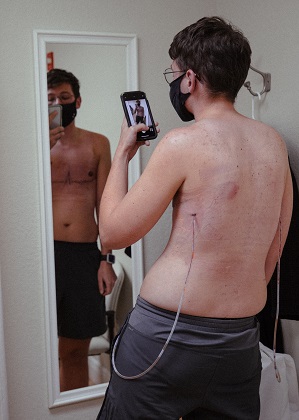8 Questions to Ask Your Doctor Before Undergoing Top Surgery from Serenity's blog
Top surgery is a procedure for transgender men to remove breast tissues. It is also known as masculinizing chest surgery because it reconstructs, removes, and tailors the breasts to make them appear masculine.
What Is Top Surgery?
 If your breasts are small, you may be able to have surgery that spares your skin, nipple, and areola. This means that your nipples and areola will not be taken off, resized, and implanted back into position. However, if your breast size is large, you will have to undergo the surgical process.
If your breasts are small, you may be able to have surgery that spares your skin, nipple, and areola. This means that your nipples and areola will not be taken off, resized, and implanted back into position. However, if your breast size is large, you will have to undergo the surgical process.
Why is this Transition Process Performed?
Most transgenders feel their expression or experienced genders are different from their current bodies. To ease off this discomfort and out-of-place feeling, transgender men often opt for top surgery.
Who is Eligible for Top Surgery?
Top surgery is a serious, life-changing process that needs to be planned and considered quite carefully. Planning for transition is very important. People also have to consider the limitations of the procedure as well.
Children under the age of 18 years are not allowed to undergo this surgery, even if parents and families show support. For youngsters. this is forbidden in all states and anyone found guilty could face serious charges. In the same cases, some doctors advise adults against this surgery too. These are usually due to prolonged health problems or difficult procedures.
How High School Educators Can Help You Understand the Process?
The transition process begins when you first learn about it. You can find a lot of published work in the form of research that can help you understand it.
Many transgender persons are aware of gender dysphoria as early as 16 years of age. Schools and other resources are gradually making an effort to include this in their sex education curriculum. Teachers can also collaborate with relevant resource centers so that more children, parents, young adults are aware of this surgery.
What Goes into Transition Planning?
Medical researchers have published many writings on the subject of transition. They have explained the different procedures available, in simple words and with details as well. You can also get information regarding the transition from your nearest resource center.
There are a lot of resources available on the subject. People can find out everything from the structure of the breasts to the procedure required to remove them. In case anyone is interested, they can also look for support groups. This way, it can become easier to deal with the challenges of the transition surgery.
You can also go through helpful links and sources to get a better idea about the transition. Ultimately, a medical expert is your best bet to understand the needs and requirements of the surgery.
A physician or surgeon will conduct necessary tests to make sure that the person is eligible for the transition. After which, they will provide them with the result and also offer guidance about the process.
To make sure you know what you’re in for, it’s best to consult with your doctor. You can get tips or voice your concerns regarding your transition directly. Here are 8 questions you should ask your doctor before undergoing transition surgery to avoid trouble in the future.
What Type of Top Surgery Procedure Would Suit Me?
 As mentioned previously, each body type is different. So, it’s important to ask your doctor what transition procedure is best suited to your goals and needs. Keep in mind that a child and adult transition are entirely different things.
As mentioned previously, each body type is different. So, it’s important to ask your doctor what transition procedure is best suited to your goals and needs. Keep in mind that a child and adult transition are entirely different things.
After a quick analysis, your doctor will be able to explain the various types of available solutions. They will also discuss the importance of the one you require, and why to opt for it.
What Are the Risks and Complications?
Transgender people have to face a lot of issues even after getting top surgery. A quick search will give you an idea of the risks and complications involved with top surgery. For instance, the possibility of developing a seroma or hematoma.
Your doctor will focus on your particular body type and answer these questions accordingly. Moreover, there are certain food items like beef jerky that cannot be consumed.
They may also guide you through the symptoms you need to look out for. Medical professionals also give tips and explain how to manage complications if they occur to eliminate fear.
What Are ‘Dog Ears’ and How to Avoid Them?
Since ‘dog ears’ are a common reason for revision surgery, you should get a general idea about what they are by discussing it with your doctor.
This is basically a phrase that’s used to refer to excess skin and fat that ‘pop’ out at the incision line. It goes around the side of the chest in Double Incision Top Surgery.
You should inquire if dog ears are a part of your surgeon’s revision surgery policy. The cost of revision surgery can actually be higher than the actual one.
What Happens on the Day of the Surgery?
Once the person reaches the hospital site and checks in, the process begins. Depending on the procedure (double incision, periareolar, or keyhole), the surgery can last between 1.5 to 4 hours. You can ask your doctor questions about the surgery itself or post-procedure care and estimated recovery time.
How to Receive Transition Help?
Parents play an important role in their kids’ lives. Every child requires love and attention but those who are struggling with transition, need it the most.
The first place most youngsters will look for help is among their families and friends. Apart from parental figures, a teacher in college, university, and any other academic institutes play a significant role too.
However, if you think you are unable to get the right kind of help, you can always contact your surgeon to help you find resource centers and support groups. Usage of transitional words and other words of encouragement is also equally important.
Education and knowledge need to be given to kids and adults alike. For example, teachers organizing seminars for their students might prove to be beneficial as they grow up.
Do You Need to See a Therapist Before Undergoing Surgery?
Top surgery and the transition process are an emotional procedure that comes with many challenges. In order to make sure you are mentally fit for the procedure, many surgeons require a letter from a mental health professional. This gives them an assessment of your state of mind. Since you will require a lot of mental stability and strength later on as well, you can try out a few techniques by yourself as well. The 10 minutes awakening program is a tried and tested solution for achieving mental peace and a boost in confidence as well.
Do I Need to Stop Taking Testosterone?
Before your surgery, the surgeon will provide you with some guidelines and tips that may require you to stop certain foods, testosterone, and smoking.
Will I have Drains After the Surgery?
Most people believe that drains and top surgery go hand-in-hand. However, some surgeons don’t use drains so whether or not you get them is entirely dependent on the type of procedure.
Finally, you may wonder how much pain you’ll go through during or after the surgery. This contrasts from person to person though usually, it is less than moderate. Furthermore, your surgeon will brief you with post-operative instructions and how to take care of your incisions in a proper manner.
What More to Do?
You must understand the service, procedure, and any complications you may develop during your transition process. This way, the pre-and post-transition process will feel like a breeze. With tips from your doctors and necessary precaution, you can successfully complete the transition surgery without facing any issues.

The Wall